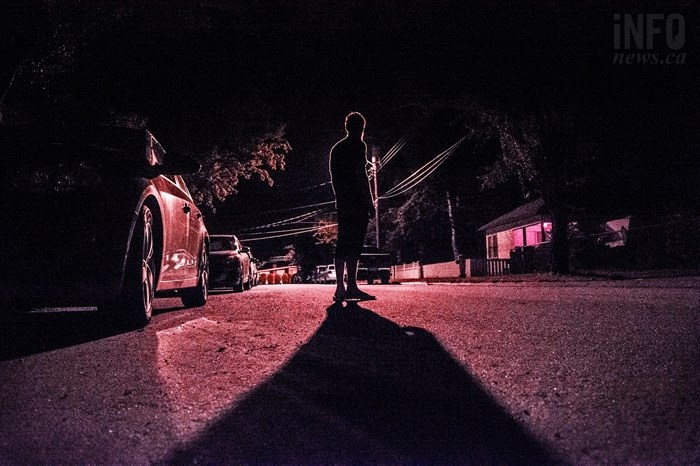
A survey of 264 youth from Penticton found that 5% of respondents reported being homeless or living in a precarious housing situation.
(DAN WALTON / iNFOnews.ca)
February 17, 2022 - 6:00 PM
Penticton council got an eye-opening glimpse at how many young people in their city struggle when a report about youth homelessness was presented this week.
The youth-led homelessness research report – titled Nowhere to Go – included anonymous interviews with young people who struggle to keep a roof over their heads.
Among the interviewees was a young woman who can’t escape an unhealthy relationship with her landlord, a non-binary teen who faced abuse at both of their divorced parents' houses and a 16-year-old whose mom never checked up on her while she was homeless for three months.
The woman in an unhealthy relationship with her landlord wouldn’t be living with him if she had anywhere else to stay, according to the report. It calls her living situation tangled and exploitative as she is sexually involved with the landlord who demands the money she receives from social assistance.
“He knows I am on welfare and he expects it,” she said in the report. “He makes me go to the bank, deposit my cheques, and give the money to him.”
While she has tried to leave the situation – having slept in her car, in a tent and twice at the transition house – she always ends up returning. The landlord will withhold her cat, personal items and important documents as a means of control over her, reads the report, adding that the police have been called “a number of times” but were unable to help her leave for good.
READ MORE: Time has come to move beyond Housing First model for homeless people in Interior Health
The non-binary teen said in the report that both of their parents struggle with alcoholism. They would isolate themselves in their room to avoid abuse before leaving home at 16 after contemplating the decision for years.
They have since obtained a youth agreement, in which the Ministry for Children and Family Development provides them with $1,250 per month. Youth agreements are made “in cases of extreme need,” according to the ministry website.
After paying the monthly cost of rent, there is only $50 remaining from the monthly allowance, but the new living arrangement is much better for them.
Now, they have “no anxiety about going home or fear. It’s not the Hilton but it feels safe... It f*cking sucks to not be able to feel safe in your home,” they said in the report.
However, they are fearful the youth agreement could get pulled, and also about how they will meet their housing needs once they turn 19 and lose access to it.
READ MORE: Poverty is about more than homelessness in the Okanagan
The 16-year-old, who never heard from her mom while homeless for three months, has since found a bed at a transition house. Before she was kicked out of her family home, she was beaten so badly by her older brother she was hospitalized. After she was kicked out she had a friend’s couch to sleep on, but then she had a rift with the friend’s boyfriend and was left with no place to stay.
She was scared to sleep at night, largely because of predatory men, and often got high to stay awake through the darkness. She reported going two weeks without eating at one point.
She tried to access the local shelter but was unable because she was under 19.
“I did things I didn’t want to do to have somewhere to sleep,” she tearfully told the interviewer. “They could have helped me, but chose not to. Youth need safe places to live.”
Things are now looking brighter for her – she has returned to school, is receiving support from a counsellor and addressing her substance use.
READ MORE: How Penticton's homeless people cope at -20 C at night
Kim Lyster, the consultant who presented the report to council, pointed out the common themes among homeless youth in Penticton.
Many come from homophobic or transphobic families.
“They tried to come out to parents and their parents abandoned them,” Lyster said.
Poverty, racism and addiction are contributing factors in many circumstances. Many have cognitive disabilities, needs being unmet, and trauma that is not being managed properly, she said.
The report was endorsed unanimously by council and staff will now work to implement its recommendations.
Mayor John Vassilaki said it’s “absolutely imperative” that city council addresses the issues outlines in the report.
Councillor Judy Sentes said, “tragically it’s largely a silent problem” as the public does not notice most of their struggles.
“This is our future we’re talking about, these young people need our help. They have much to offer if they can just get through this tragic time in their lives," Sentes said.
The report generated much of its own data by surveying 264 local youth, to which 5% reported being homeless or in a precarious housing situation.
To read the report, go to page 89 on the council meeting agenda here.
To contact a reporter for this story, email Dan Walton or call 250-488-3065 or email the editor. You can also submit photos, videos or news tips to the newsroom and be entered to win a monthly prize draw.
We welcome your comments and opinions on our stories but play nice. We won't censor or delete comments unless they contain off-topic statements or links, unnecessary vulgarity, false facts, spam or obviously fake profiles. If you have any concerns about what you see in comments, email the editor in the link above.
News from © iNFOnews, 2022